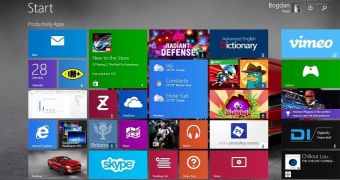Windows 8 was launched more than a year and a half ago, but people are still hating the operating system and, what's worse for the Redmond-based tech giant, some are even refusing to upgrade and instead prefer to stick to Windows XP and Windows 7.
Of course, it was only a matter of time until disappointed Windows 8 adopters started blasting Microsoft for what it did with the operating system, with a lot of people claiming that the software giant was the only one responsible for losing so much ground in the OS market.
In fact, Microsoft hasn't lost so many users in the desktop OS market, but many actually purchased tablets and smartphones, which obviously led to a significant increase in the mobile market share as well for all these platforms.
At this point, Windows still owns 90 percent of the desktop OS market and is very likely to maintain its market share in the coming months and maybe years, as neither Linux nor Mac OS X seems to have what it takes to compete with Microsoft's operating system in the long term.
Getting back to Windows 8, after Windows Vista, this is clearly the most controversial operating system ever released by Microsoft. The Windows 8 hate continues today, even though many users actually managed to adapt to the new interface in the meantime, but we're still hearing from our readers that some people choose to stick to Windows 7 or even downgrade when buying a new computer powered by Windows 8.
But as weird as it might sound, you shouldn't really hate Microsoft for Windows 8.
Things are much simpler than you might be tempted to believe. When it comes to Windows 8, most people are disappointed with the number of changes implemented in the operating system, starting with the removal of the Start menu and ending with the new Modern UI and the Start screen.
Basically, all these changes have attracted quite a lot of criticism for Microsoft, no matter how hard company executives have tried to convince users to give them a chance. Many have deployed third-party Start menu apps, while some have turned to software solutions that would make Windows 8 look and feel like Windows 7.
Microsoft, however, hasn't tried to tweak its operating system just for the same of changes. In fact, the company said with several occasions that Windows 8 was an improved version of Windows 7 that brought the same features as its predecessor but with some significant additions.
And the software giant didn't lie. Windows 8 is indeed an improved flavor of Windows 7, but the first thing that new adopters see is the removal of the Start menu and the new Start screen. Plus, some find the new Metro UI very confusing, saying that it's extremely difficult to get around an operating system that works with both Modern and desktop apps.
The Redmond-based company actually tried to improve the operating system in such a way that it would more or less force users to adapt to the changing IT world. Technology has evolved so much lately that each and every one of us needs new products, including an operating system, which could help make the most of all novelties and thus ease our lives as much as possible.
That's the purpose of Windows 8. The new operating system was designed from the very beginning not to make your more confused, but to help get things done faster and easier.
It's a well-known fact that human beings are afraid of changes. Why change something that works perfectly? That's the main question we've heard after the launch of Windows 8, with many users claiming that Windows 7 is already good enough to help users perform their daily activities.
But is it? Windows 7 was never an operating system supposed to be used on touch-capable devices, and although it does work well, there's no doubt that Windows 8 is faster and more secure, not necessarily because it's newer, but thanks to the fact that it comprises technologies which allowed Microsoft to improve certain areas.
Yes, Windows 8 does revise a few things here and there, but people need this change. If nobody has the guts to bring in this change, we can never evolve.
As Steven Sinofsky, the former Windows boss who left Microsoft after the launch of Windows 8, said, the same happened with the Start menu when it was launched. People were very reluctant to try it and some criticized it for many months, but in the end everyone got addicted to it.
Windows 8 brings some changes that we really need, even though some of us do not actually realize this. They're changes that help us adapt to the modern world which, no matter if we accept it or not, is expanding everywhere we look, and an operating system that could bring us in line with the other products on the market is a must-have.
Fortunately, Microsoft had the courage to bring Windows 8 to the market so soon. Although its market share is still below expectations at this point, I have absolutely no doubt that figures will change significantly in the coming years, especially because the company is already working on some pretty big innovations for Windows users.

 14 DAY TRIAL //
14 DAY TRIAL //